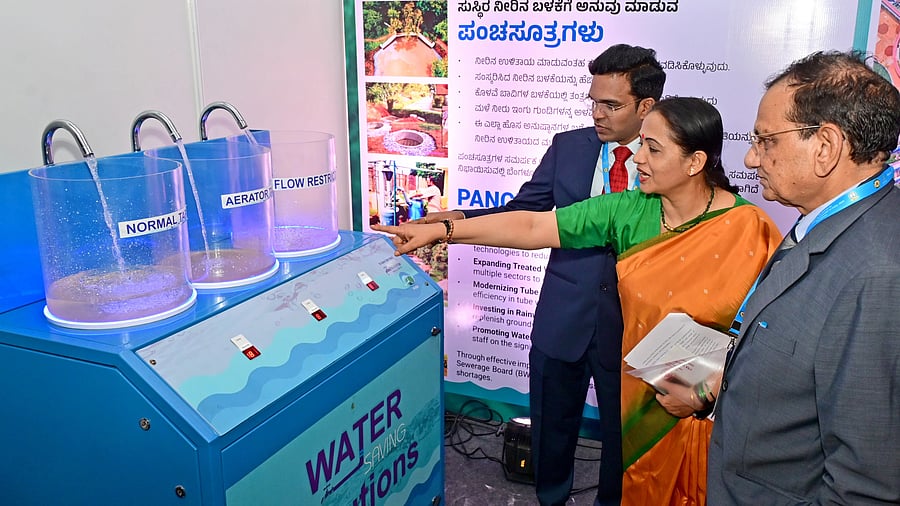
(From left): BWSSB Chairman V Ram Prasath Manohar, Chief Secretary Shalini Rajneesh and NITI Aayog Member Vinod K Paul, at a two-day workshop on ‘Reuse of Treated Water in India,’ in Bengaluru on Thursday. Credit: DH PHOTO
Bengaluru: The critical issue of water security took center stage as the Bangalore Water Supply and Sewerage Board (BWSSB), in collaboration with NITI Aayog, kicked off a two-day national workshop on the "Reuse of Treated Wastewater in India" here on Thursday.
The event, inaugurated by Chief Secretary Shalini Rajneesh, had a contingent of policymakers, researchers, engineers, and water management professionals from over 18 states to deliberate on sustainable wastewater management.
Delivering the keynote address, NITI Aayog Member Vinod K Paul, gave a stark national perspective. According to the Central Water Commission, India’s per capita water availability has dropped to 1,367 cubic metres, breaching the “water stress” benchmark of 1,700 cubic metres and inching closer to the “water scarce” level of 1,000 cubic metres.
He stressed that reuse should be viewed as an “environmental imperative, a circular economy imperative, and a health imperative.”
Paul said only 11 states have a wastewater reuse policy, and urged the remaining to “develop a reuse policy for your state and UTs” in four to six weeks.
In her inaugural address, Chief Secretary Shalini Rajneesh, recounted the serious drought faced by the city last year. A quick-thinking move, led by BWSSB Chairman Ram Prasath Manohar and Additional Chief Secretary Tushar Giri Nath, involved a water audit that revealed a surplus of treated wastewater but a deficiency in potable water.
“Ram Prasath and his team came out with this idea: Why don’t we start selling this treated water and make it compulsory for non-drinking water purposes?” Shalini said. This resulted in a strict order mandating use of treated water for construction and industrial activities".
This led to the utilisation of an astonishing 800 TMC of treated water, suddenly transforming the city from “deficiency to water surplus.”
Additional Chief Secretary Tushar Giri Nath said, “We don’t call it wastewater, because we have the concept of one water.” He noted that while Bengaluru is a national leader in wastewater treatment, “still there is a gap of 500 MLD that we should meet.”
Representing the Ministry of Housing and Urban Affairs, D Thara, stressed the economic importance of treating wastewater as a recoverable asset. She said Bengaluru’s water revenue, currently around Rs 190 crore, could rise to Rs 1,000 crore with structured reuse, metering, and resource recovery systems.
‘Urgent need to scale up water treatment infra’
Speakers at the workshop stressed that India must urgently transition to a circular water economy warning that the future of resource security hinges on its success. Setting the context Partner and Head - Government and Public Services at KPMG Nilachal Mishra highlighted the geopolitical gravity of the issue predicting that future conflicts will be fought over water resources not oil. With the country generating 75000 MLD of wastewater daily and treatment capacity covering only about 40% of this volume he pointed to the urgent need to rapidly scale up infrastructure and planning.
Bengaluru’s success in turning a water deficit into a temporary surplus through mandated reuse was cited as a national blueprint. Building on the infrastructure challenge Vishal Gandhi Scientist E from the Central Pollution Control Board (CPCB) outlined the regulatory push to mandate reuse and conservation. He noted the success of continuous monitoring efforts which have seen a reduction in the number of polluted river stretches from 320 to 296 in recent years.
